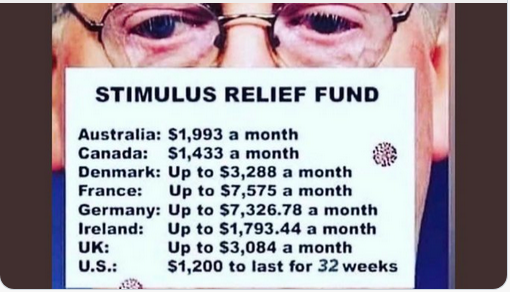I agree. I would make the UBI current to today's minimum wage (about $1,200 an month), and I would make the alternative FJG pay anywhere from $16 to $20 per hour worked. Most people would prefer to work.
https://blog.usejournal.com/how-modern- ... 8a67a1556dIf we can spend more, what should we spend it on? A job guarantee? Universal basic income?
Policymakers could use MMT to justify spending money on any number of government sponsored programs, including free college, Medicare for All, free childcare, universal basic income etc. And many MMT economists do support some or all of them. But if there’s one idea that promises to reduce inequality the most within the MMT framework, it is the job guarantee. Here are the main reasons, contrasted with the other popular anti-poverty idea making waves these days — universal basic income (UBI).
Higher wages. If the limit to government spending is inflation, and increasing national output lowers inflation, then we can spend more if we create more. A guaranteed wage under a federally funded job guarantee could therefore be much higher than a federally funded UBI. Tcherneva provides a mathematical model for why that’s the case here. This paper from Wray, Dantas, Fullwiler, Tcherneva, and Kelton models what the program would actually look like and finds that if the job guarantee employed 15 million people and paid $15 / hour for full time work (~$30,000 a year), plus benefits, inflation would only rise 0.74 percent. Meanwhile, supporters of UBI generally support UBI incomes that are much lower, due to inflation. Andy Stern’s UBI proposal and Sam Altman’s UBI field study, which are more generous than most UBI proposals, propose $12,000 per year. UBI as a result is strictly an anti-poverty measure, while a job guarantee could get folks closer to a middle class lifestyle.
Better health, social mobility, and education. Less incarceration and suicide. Unemployment causes serious negative secondary effects. These include higher suicide rates, increased sickness/healthcare costs, declining mental health, increased incarceration rates, and lower social mobility and educational attainment for children of unemployed people. Studies showing the results of these effects are explored in Tcherneva’s paper here. All these secondary effects carry social costs that get worse during economic downturns, and so employment can be seen as a social good. And while we don’t have enough data to make claims about UBI’s effects on these social outcomes, the bar is pretty gosh darn high.
Better help for our most marginalized communities. While UBI would certainly help reduce poverty and improve social outcomes among all demographics, its inherent focus is everyone — not communities who have been held back the most. Simply put, when it comes to addressing the barriers for black wealth accumulation, most of our policies — whether they be education, skills, or family focused — rest on assumed deficiencies of black people themselves, not the ongoing structural barriers that prevent black wealth accumulation. While a job guarantee doesn’t fix racism, it provides a direct link to jobs as opposed to relying on education or the private sector — which can have their own racist barriers. In a paper published by the Federal Reserve Bank of St. Louis Review, economists Darrick Hamilton and William “Sandy” Darity Jr. walk through the myths of the Black wealth and employment gap and are joined by Alan Aja and Daniel Bustillo in explaining why these gaps are best addressed through a jobs guarantee here. And of course Black communities are not the only ones who stand to gain. Aja, Carrillo, and Rita Sandoval explain why Latinx communities should care about the job guarantee here. For a by-the-numbers breakdown, The Wray, Dantas, Fullwiler, Tcherneva, and Kelton paper estimates who would participate in a job guarantee, broken down by race and gender. They find that Black and Latinx communities and women would directly benefit the most out of a job guarantee plan.
A better stabilizer when the economy tanks. Private markets go up and down in cycles, creating a greater need to address unemployment and poverty in the down times, and less of a need during the good. UBI does nothing to counteract these cycles, while a job guarantee is at its peak usefulness during the lowest moments of our economy.
Socially useful projects. The private sector is not capable of creating goods and services that people want when it’s difficult to capture value (aka get people to pay for it). Cleaning the environment is one big example, and solutions are generally government-sponsored (e.g. Pakistan just pledged to plant 10 billion trees in 5 years to fight climate change). Our own health is another. To be clear though, the “what will people actually do” under a job guarantee is still a hotly debated issue and is the question I’m personally most interested in these days. And to all the Pessimistic Patricks out there saying there just aren’t enough jobs that the government could provide to employ folks, the options are as limitless as human needs are. All these jobs need to be is useful for this policy to work. There most definitely are enough needs and jobs out there to fulfill a job guarantee.
It competes with bad jobs and doesn’t subsidize good ones. If McDonalds had to compete with a job guarantee, what would they do? Either raise wages or automate. Both are totally acceptable outcomes with a job guarantee in place. If there was a UBI, there would be a higher chance McDonalds would decrease wages than increase wages. Given UBI without a job guarantee, any pressure to raise wages to a living wage standard would be due to federal or state laws making them.
To reiterate, the job guarantee is not mutually exclusive with UBI — many MMTers want both given some people are not able to work and yet have every right to live above poverty. However, there is a general belief that a job guarantee would provide for a higher standard of living for the poorest among us, would create a more inclusive economy across race, gender, income, and age, would make recessions suck less, and could accomplish some truly useful goods and services that the public sector is not willing to do.




